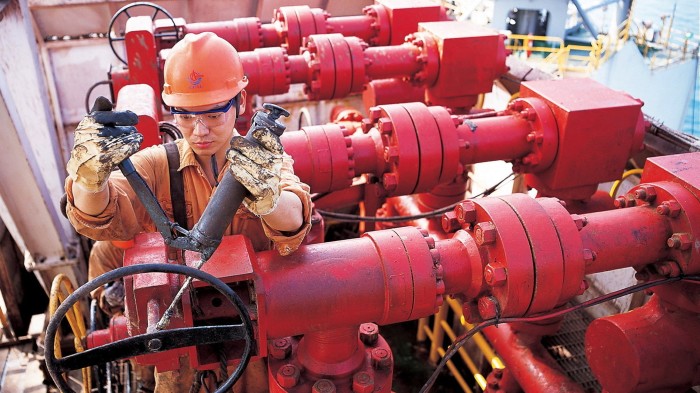Unlock the Editor’s Digest for free
Roula Khalaf, Editor of the FT, selects her favourite stories in this weekly newsletter.
Chinese oil traders are setting aside concerns over the long-term economic damage of a US trade war as they seek to profit from one of the short-term consequences: lower crude prices.
Imports of crude oil into China surged in March and have continued to accelerate in April, according to analysts, as the country replenishes stocks despite expectations that a weaker global economy will reduce demand.
Kpler, a data company that tracks tankers sailing into China, said the country was importing nearly 11mn barrels a day, the highest level in 18 months and up from 8.9mn b/d in January.
What started as a buying spree of Iranian oil, on fears of further US sanctions, has developed into a broader stockpiling of crude after President Donald Trump’s tariff announcements, coupled with an increase in production by oil cartel Opec, sent prices sliding to a four-year low.
Benchmark Brent crude later rebounded to trade at just above $65 a barrel on Friday. Morgan Stanley believes prices will remain under pressure, falling to an average of $62.50 a barrel in the second half of the year.

“China has always been very price-sensitive,” said Giovanni Staunovo, an oil market analyst at Swiss bank UBS. “If the price is low, they stockpile it, and then reduce their buying when prices rise. I expect this month’s data to be higher than last because of this strategic buying.”
Kpler’s Johannes Rauball noted that Chinese oil stocks were low, and said he expected the current level of imports to continue over the next few months as buyers take advantage of low prices to restore their inventories.
“You could see a rise in imports even if demand [for oil] does not pick up as strongly,” he said.
Most analysts believe that the economic impact of the US-China trade war will start to bring down oil demand in the second half of this year, as the economy starts to slow.
But the turbulence does not yet seem to have seriously affected China’s appetite for road or aviation fuel, and some refineries have delayed their annual maintenance in order to keep producing gasoline, diesel and jet fuel while crude prices are low and margins are healthy, said Emma Li, a Singapore-based analyst at market data company Vortexa.
“Nobody knows what will happen in the following months, especially the second half,” she added. “But demand looks quite healthy so I am not expecting too much decline.”

China is the world’s largest oil importer, and the main market for oil that has been forced out of other markets, including Russian, Iranian and Venezuelan crude.
Chinese buyers have scaled back their purchases of Iranian oil since the beginning of April, when the US for the first time imposed sanctions on a refinery in eastern Shandong province, the home of many private Chinese refiners. After importing a record 1.8mn b/d of Iranian oil in March, purchases have dropped to 1.2mn b/d in April, said Kpler.
“There is some cautiousness within private refineries and there have been some logistical hurdles with some tankers being sanctioned,” said Rauball, adding that the amount of Iranian crude sat in tankers at sea has risen rapidly. “We currently see 40mn barrels in 36 vessels. 18mn barrels are in Singapore, 10mn are in the Yellow Sea and around 4mn in the South China Sea.”
He added that private refineries are likely to continue to import Iranian crude because of its discounted price.
“Their margins are slim, and they don’t have an alternative. Either they import from Iran or they go bankrupt,” Rauball said. “A lot of them are not linked to the US financial system, so the consequences are less even if they do get hit.”







